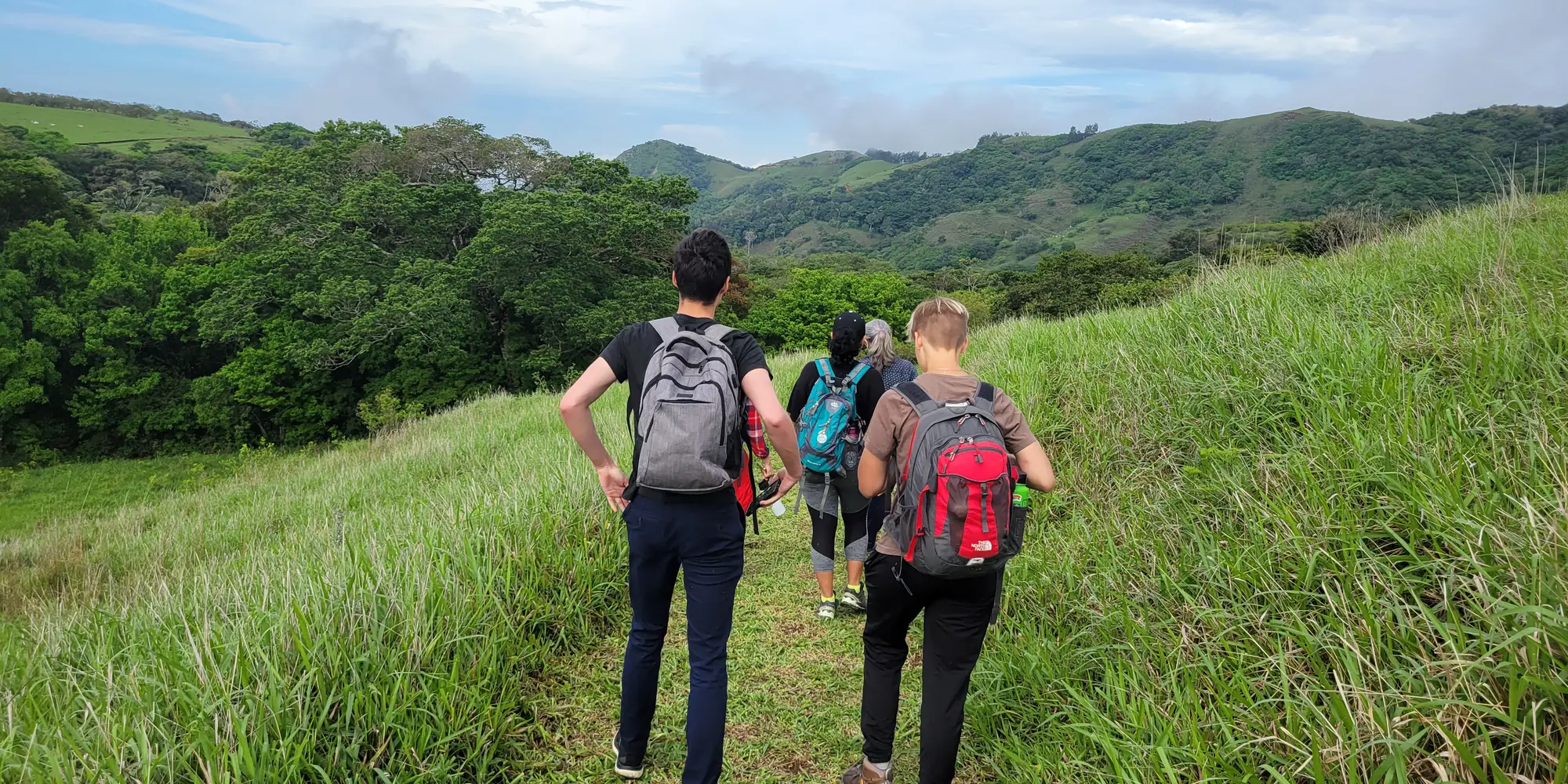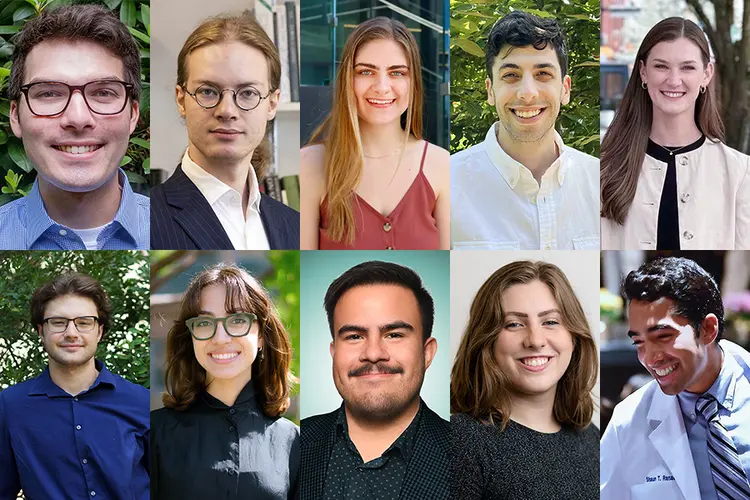
CMU Study Abroad Program in Costa Rica Combines Biodiversity, Spanish and Statistics
Media Inquiries
Two departments from Carnegie Mellon University’s Dietrich College of Humanities and Social Sciences(opens in new window) are partnering with the Monteverde Institute in Costa Rica to offer a study abroad and experiential learning program that immerses students in tropical ecology, statistics and cultural studies.
Open to all CMU students, previous participants have represented majors including biology, Hispanic studies, international relations, global studies and statistics.
“In my opinion (this program) is incredibly unique,” said Debra Hamilton, research affiliate at the Monteverde Institute and president of the Costa Rica Conservation Foundation. “The students support ongoing investigations by providing models and analysis to the researchers who provide the field data.”
The Department of Languages, Cultures & Applied Linguistics(opens in new window) (LCAL) initiated the program in 2022.
“The Monteverde program was our first new summer study abroad program coming out of the pandemic, which had significantly curtailed these impactful opportunities,” said Anne Lambright(opens in new window), LCAL department head and Paul Mellon Distinguished Professor of Hispanic Studies.
“The idea with this program, as well as subsequent additions to LCAL's unique study abroad portfolio(opens in new window) — which all link language and culture study with hands-on learning in meaningful ways — was to provide a ‘so CMU’ signature experience for our students.”
In its third year, the program was joined by the Department of Statistics & Data Science(opens in new window). In addition, Richard Laval, a renowned bat biologist and Carnegie Mellon alumnus (then Carnegie Institute of Technology), led a bat activity and met with students to share stories from his time at the university.
“We've been actively seeking partnerships across campus, where our programs and their locations offer logical fits and exciting opportunities for other disciplines. In the case of Costa Rica, we knew the renowned Monteverde Institute had loads of data that they lacked the capacity to fully process and utilize. Thus, Statistics & Data Science was a natural partner,” Lambright said. “The fact that some students would be working with data from the decades-long research of a Carnegie Tech alum was icing on the cake.”
Rebecca Nugent(opens in new window), head of the Statistics & Data Science Department, said the Costa Rica program was a perfect opportunity for partnership.
“Study abroad for STEM (science, technology, engineering and math) fields tends to be less common due to the sequential nature of their coursework, but those experiential learning opportunities are so crucial to students’ understanding of how to solve real-world problems where different cultures and perspectives are often core to the problem’s context,” said Nugent, the Fienberg Professor of Statistics & Data Science. “We want our statistics and data science students to be analytical leaders who have a global impact.”
An immersive study abroad experience
Costa Rica is one of the most biodiverse countries in the world. The country is on track to meet the goals of its National Decarbonization Plan(opens in new window) through reforestation efforts, rigorous conservation laws and a strong commitment from both government and civil society. According to program director Therese Tardio(opens in new window), teaching professor of Hispanic studies, the Monteverde Institute provides students an opportunity to learn firsthand about sustainability and environmental stewardship in a country steeped in these ideals, while also seeing up close the challenges the climate crisis poses in this context.
During the program, students select the direction of their research by focusing on tropical ecology or working on projects in stream ecology, water monitoring and reforestation. Another option available to students: analyzing data collected and provided by the Monteverde Institute to further understand their stewardship and sustainability projects. Students have also held internships with a local doctor, a high school teacher, a women's organization and a community garden. Students can also engage in anthropological oral history projects in collaboration with Monteverde researchers and local community organizations.
“One of the biggest lessons in fieldwork is you design the data collection process and then go into the field and realize that nature does not work in the same organized way,” said Hamilton. “It is such a surprise to students when they realize that part of your work is testing your methods.”
While Spanish is not a prerequisite to enroll, every student takes a Spanish class during the program. Their language skills are developed further through homestay with local families. Each student takes one additional class of their choice — either a course on Costa Rican culture, tropical ecology, or statistics and data science.
Students also participate in excursions throughout the region, visiting a sustainable fishery, organic farms, and hikes through the cloud forest and rainforests.
A CMU student’s experience
Being part of the local community is a key component of this program. The Monteverde Institute works on projects nominated by the local community, such as habitat restoration to protect declining bird species like the three-wattled bellbird.
“I was most looking forward to understanding the impacts of environmental policy on smaller communities,” said Arika Manuel (DC 2026), who joined the 2024 program. “I wanted to participate in this program because it allowed me to explore many different topics about conservation, community development and the impacts of policy.”
Manuel, who is majoring in international relations and political science(opens in new window) and environmental and sustainability studies(opens in new window), was drawn to the program’s involvement in community-led research projects, especially in the Monteverde Cloud Forest. Her project examined the health of local streams by focusing on biodiversity. During the summer, she analyzed a dataset of stream health indicators, including air and water temperature, pH levels, turbidity, and other factors since 2019.
“This project allowed me to enhance my data analysis and statistical skills and apply them to contextually understand my environmental data,” said Manuel. “In the future, I hope to contribute to policy decisions that promote environmental sustainability and improve ecosystem health.”
A nonprofit educational organization, the Monteverde Institute is a world-renowned center of study in the Puntarenas region of Costa Rica, dedicated to sustainable environmental practices and community engagement. The institute is located within the Monteverde Cloud Forest, part of the Bellbird Biological Corridor. The region exemplifies Costa Rica’s biodiversity, and the work being done at the institute has been lauded as a model for its progressive environmental practices.
“This program offered such an immersive and hands-on experience,” said Manuel. “My time in Monteverde has solidified my passion for environmental research and policy, and I'm excited to apply this knowledge in future endeavors.”


